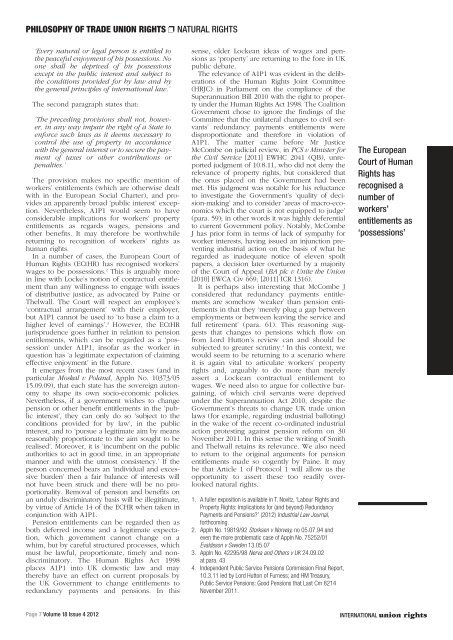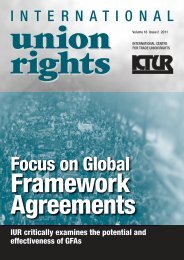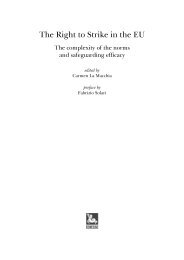International Centre for Trade Union Rights
International Centre for Trade Union Rights
International Centre for Trade Union Rights
Create successful ePaper yourself
Turn your PDF publications into a flip-book with our unique Google optimized e-Paper software.
PHILOSOPHY OF TRADE UNION RIGHTS ❐ NATURAL RIGHTS<br />
‘Every natural or legal person is entitled to<br />
the peaceful enjoyment of his possessions. No<br />
one shall be deprived of his possessions<br />
except in the public interest and subject to<br />
the conditions provided <strong>for</strong> by law and by<br />
the general principles of international law.’<br />
The second paragraph states that:<br />
‘The preceding provisions shall not, however,<br />
in any way impair the right of a State to<br />
en<strong>for</strong>ce such laws as it deems necessary to<br />
control the use of property in accordance<br />
with the general interest or to secure the payment<br />
of taxes or other contributions or<br />
penalties.’<br />
The provision makes no specific mention of<br />
workers’ entitlements (which are otherwise dealt<br />
with in the European Social Charter), and provides<br />
an apparently broad ‘public interest’ exception.<br />
Nevertheless, A1P1 would seem to have<br />
considerable implications <strong>for</strong> workers’ property<br />
entitlements as regards wages, pensions and<br />
other benefits. It may there<strong>for</strong>e be worthwhile<br />
returning to recognition of workers’ rights as<br />
human rights.<br />
In a number of cases, the European Court of<br />
Human <strong>Rights</strong> (ECtHR) has recognised workers’<br />
wages to be possessions. 2 This is arguably more<br />
in line with Locke’s notion of contractual entitlement<br />
than any willingness to engage with issues<br />
of distributive justice, as advocated by Paine or<br />
Thelwall. The Court will respect an employee’s<br />
‘contractual arrangement’ with their employer,<br />
but A1P1 cannot be used to ‘to base a claim to a<br />
higher level of earnings’. 3 However, the ECtHR<br />
jurisprudence goes further in relation to pension<br />
entitlements, which can be regarded as a ‘possession’<br />
under A1P1, insofar as the worker in<br />
question has ‘a legitimate expectation of claiming<br />
effective enjoyment’ in the future.<br />
It emerges from the most recent cases (and in<br />
particular Moskal v Poland, Appln No. 10373/05<br />
15.09.09), that each state has the sovereign autonomy<br />
to shape its own socio-economic policies.<br />
Nevertheless, if a government wishes to change<br />
pension or other benefit entitlements in the ‘public<br />
interest’, they can only do so ‘subject to the<br />
conditions provided <strong>for</strong> by law’, in the public<br />
interest, and to ‘pursue a legitimate aim by means<br />
reasonably proportionate to the aim sought to be<br />
realised’. Moreover, it is ‘incumbent on the public<br />
authorities to act in good time, in an appropriate<br />
manner and with the utmost consistency.’ If the<br />
person concerned bears an ‘individual and excessive<br />
burden’ then a fair balance of interests will<br />
not have been struck and there will be no proportionality.<br />
Removal of pension and benefits on<br />
an unduly discriminatory basis will be illegitimate,<br />
by virtue of Article 14 of the ECHR when taken in<br />
conjunction with A1P1.<br />
Pension entitlements can be regarded then as<br />
both deferred income and a legitimate expectation,<br />
which government cannot change on a<br />
whim, but by careful structured processes, which<br />
must be lawful, proportionate, timely and nondiscriminatory.<br />
The Human <strong>Rights</strong> Act 1998<br />
places A1P1 into UK domestic law and may<br />
thereby have an effect on current proposals by<br />
the UK Government to change entitlements to<br />
redundancy payments and pensions. In this<br />
sense, older Lockean ideas of wages and pensions<br />
as ‘property’ are returning to the <strong>for</strong>e in UK<br />
public debate.<br />
The relevance of A1P1 was evident in the deliberations<br />
of the Human <strong>Rights</strong> Joint Committee<br />
(HRJC) in Parliament on the compliance of the<br />
Superannuation Bill 2010 with the right to property<br />
under the Human <strong>Rights</strong> Act 1998. The Coalition<br />
Government chose to ignore the findings of the<br />
Committee that the unilateral changes to civil servants’<br />
redundancy payments entitlements were<br />
disproportionate and there<strong>for</strong>e in violation of<br />
A1P1. The matter came be<strong>for</strong>e Mr Justice<br />
McCombe on judicial review, in PCS v Minister <strong>for</strong><br />
the Civil Service [2011] EWHC 2041 (QB), unreported<br />
judgment of 10.8.11, who did not deny the<br />
relevance of property rights, but considered that<br />
the onus placed on the Government had been<br />
met. His judgment was notable <strong>for</strong> his reluctance<br />
to investigate the Government’s ‘quality of decision-making’<br />
and to consider ‘areas of macro-economics<br />
which the court is not equipped to judge’<br />
(para. 59); in other words it was highly deferential<br />
to current Government policy. Notably, McCombe<br />
J has prior <strong>for</strong>m in terms of lack of sympathy <strong>for</strong><br />
worker interests, having issued an injunction preventing<br />
industrial action on the basis of what he<br />
regarded as inadequate notice of eleven spoilt<br />
papers, a decision later overturned by a majority<br />
of the Court of Appeal (BA plc v Unite the <strong>Union</strong><br />
[2010] EWCA Civ 669; [2011] ICR 1316).<br />
It is perhaps also interesting that McCombe J<br />
considered that redundancy payments entitlements<br />
are somehow ‘weaker’ than pension entitlements<br />
in that they ‘merely plug a gap between<br />
employments or between leaving the service and<br />
full retirement’ (para. 61). This reasoning suggests<br />
that changes to pensions which flow on<br />
from Lord Hutton’s review can and should be<br />
subjected to greater scrutiny. 4 In this context, we<br />
would seem to be returning to a scenario where<br />
it is again vital to articulate workers’ property<br />
rights and, arguably to do more than merely<br />
assert a Lockean contractual entitlement to<br />
wages. We need also to argue <strong>for</strong> collective bargaining,<br />
of which civil servants were deprived<br />
under the Superannuation Act 2010, despite the<br />
Government’s threats to change UK trade union<br />
laws (<strong>for</strong> example, regarding industrial balloting)<br />
in the wake of the recent co-ordinated industrial<br />
action protesting against pension re<strong>for</strong>m on 30<br />
November 2011. In this sense the writing of Smith<br />
and Thelwall retains its relevance. We also need<br />
to return to the original arguments <strong>for</strong> pension<br />
entitlements made so cogently by Paine. It may<br />
be that Article 1 of Protocol 1 will allow us the<br />
opportunity to assert these too readily overlooked<br />
natural rights.<br />
1. A fuller exposition is available in T. Novitz, ‘Labour <strong>Rights</strong> and<br />
Property <strong>Rights</strong>: Implications <strong>for</strong> (and beyond) Redundancy<br />
Payments and Pensions?’ (2012) Industrial Law Journal,<br />
<strong>for</strong>thcoming.<br />
2. Appln No. 19819/92 Storksen v Norway, no 05.07.94 and<br />
even the more problematic case of Appln No. 75252/01<br />
Evaldsson v Sweden 13.05.07<br />
3. Appln No. 42295/98 Nerva and Others v UK 24.09.02<br />
at para. 43<br />
4. Independent Public Service Pensions Commission Final Report,<br />
10.3.11 led by Lord Hutton of Furness; and HM Treasury,<br />
Public Service Pensions: Good Pensions that Last Cm 8214<br />
November 2011.<br />
The European<br />
Court of Human<br />
<strong>Rights</strong> has<br />
recognised a<br />
number of<br />
workers’<br />
entitlements as<br />
‘possessions’<br />
Page 7 Volume 18 Issue 4 2012<br />
INTERNATIONAL union rights





